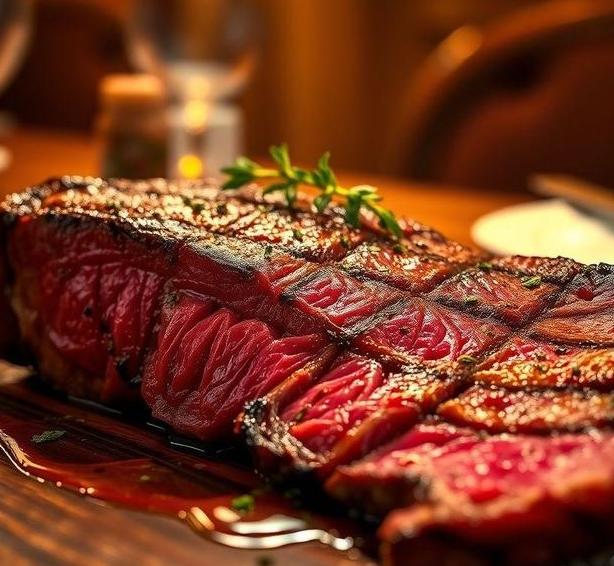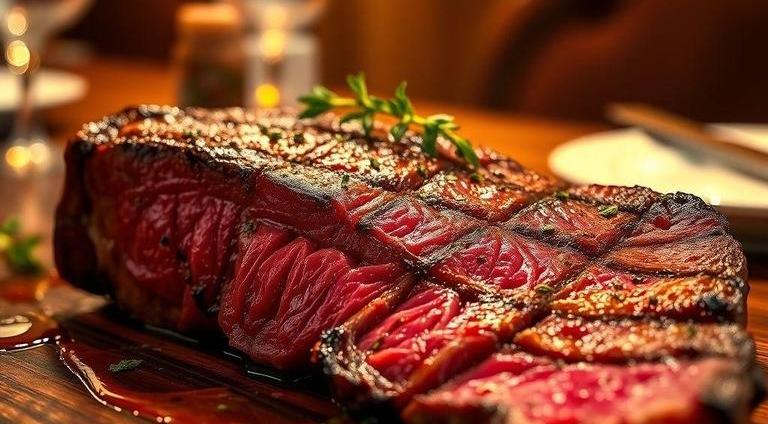Venison, the meat derived from deer, is a lean, flavorful option that is increasingly popular among hunters and culinary enthusiasts. With its distinct taste, venison offers a healthy alternative to traditional meats like beef, pork, and poultry. However, as with all meats, it’s essential to understand how to properly store it to preserve its quality and ensure it remains safe for consumption. So, how do you keep venison from going bad? What exactly should you watch out for? Let’s dive into the details.
Can Venison Go Bad?
Yes, venison, like all animal-based products, can spoil over time. The meat’s shelf life depends on various factors, such as how it’s handled, stored, and prepared. Venison is naturally leaner than most meats, and while this makes it a healthier option, it also makes it more susceptible to rapid spoilage due to its lower fat content, which can act as a preservative. Without proper care, venison can develop bacteria, mold, or off smells that indicate it’s no longer safe to eat. It’s crucial to know how long it lasts and how to properly store it to prevent any risk of foodborne illness.
Shelf Life For Venison

The shelf life of venison can vary depending on its preparation and storage method. Here’s a breakdown to help you understand how long you can keep your venison at different stages:
-
Fresh Venison (raw)
- If stored properly in the fridge, fresh venison can last 3-5 days.
- This is assuming it’s kept at a temperature of 40°F (4°C) or lower.
-
Ground Venison
- Ground meat tends to spoil faster than whole cuts. When stored in the fridge, it will last about 1-2 days before showing signs of degradation.
-
Cooked Venison
- Once cooked, venison can last about 3-4 days in the fridge. This is true whether it’s grilled, roasted, or stewed.
- Be sure to store any leftovers in airtight containers to prevent bacteria growth.
-
Frozen Venison
- The long-term storage solution for venison is freezing. When frozen, venison can last for 6-12 months without significant loss in quality.
- If vacuum-sealed, it will maintain a better texture and flavor, but even without this, freezing venison will preserve it much longer than refrigeration alone.
-
Canned Venison
- If you’re preserving venison through canning, it can last up to 1-2 years when stored in a cool, dry place.
Common Signs Of Spoilage
Venison, like any meat, can show clear signs of spoilage that are easy to spot if you know what you’re looking for. Recognizing these signs early is key to avoiding consuming spoiled meat. Keep an eye out for:
-
Unpleasant Odor
- One of the first signs of spoiled venison is a strong, sour, or rancid smell. Fresh venison has a mild, almost gamey scent, but when it starts to go bad, it will emit a distinct, foul odor that’s hard to ignore.
-
Discoloration
- Venison that has gone bad may change color, from a rich red to brown or even greenish hues. While some discoloration may happen naturally as the meat is exposed to air, an unusual color shift usually indicates spoilage.
-
Slimy Texture
- If the venison feels slimy to the touch, it’s a clear sign that bacteria have begun to multiply. A sticky or slippery film forming on the surface is a red flag.
- Fresh venison should feel firm and dry.
-
Mold Growth
- If you notice mold spots on the surface of the venison, discard the meat immediately. Mold typically forms in environments with excess moisture, so improperly stored venison can develop mold if left too long.
-
Off-Tasting
- If you’re unsure, one of the most reliable ways to tell if venison has gone bad is by cooking it and tasting it. Spoiled venison will have a bitter, off, or sour taste that is immediately noticeable.
How To Store Venison?

Proper storage is the key to preserving venison’s quality and extending its shelf life. There are several methods you can use, depending on whether you’re storing it fresh, cooked, or frozen.
-
Refrigeration (Short-term Storage)
- Always store fresh venison in the coldest part of the fridge to minimize spoilage.
- Place it in a shallow pan and cover it loosely with wax paper or plastic wrap. For better results, use a vacuum-sealed bag to prevent air exposure, which accelerates oxidation.
- Make sure the refrigerator is set to 40°F (4°C) or lower.
-
Freezing (Long-term Storage)
- To freeze venison, first cut it into smaller portions if needed, and then wrap each piece tightly in plastic wrap, followed by aluminum foil, to prevent freezer burn.
- If you can, vacuum-sealing the venison is ideal as it removes air, helping to preserve texture and flavor.
- Label each package with the date of freezing, so you know when to use it.
-
Canning
- Canning is an excellent long-term preservation method. Venison should be pressure canned to ensure that any bacteria present are killed. This method can extend venison’s shelf life for up to a couple of years, but it requires some know-how to do safely.
-
Cooking And Storing Leftovers
- For cooked venison, store it in airtight containers in the fridge. When reheating, be sure to bring it to an internal temperature of at least 165°F (74°C) to kill any potential bacteria.
-
Avoiding Cross-Contamination
- Always practice good hygiene when handling raw venison. Use separate cutting boards and utensils for raw meat, and wash your hands thoroughly before and after handling the meat.
- Keep venison separated from other foods in the fridge to prevent cross-contamination.
Expert Tips
To ensure your venison stays fresh for as long as possible, here are some expert tips:
-
Vacuum-Seal Whenever Possible
- Vacuum-sealing venison is one of the best ways to extend its shelf life, as it prevents air exposure and preserves both flavor and texture.
-
Keep Meat Cold During Transport
- If you’re transporting venison from the field, use a cooler with ice packs. Keeping the meat at a low temperature until you can process it is critical in maintaining freshness.
-
Don’t Over-Season Before Freezing
- While it may be tempting to season venison before freezing it, it’s better to freeze the meat in its raw state and season it just before cooking. This helps retain its natural flavor and texture.
-
Thawing
- Always thaw frozen venison in the fridge, not at room temperature, to prevent bacteria growth. This can take several hours or overnight, depending on the size of the cut.
-
Check Your Freezer
- Make sure your freezer is running at the right temperature (around 0°F or -18°C) to keep frozen venison at its best.
FAQs
Can Venison Go Bad If Left Out At Room Temperature?
Yes, venison can go bad if left out at room temperature for too long. Like all meats, it should not be left unrefrigerated for more than 2 hours. Bacteria multiply rapidly in the ’danger zone’ (40-140°F or 4-60°C), and this can lead to spoilage and foodborne illnesses.
How Can You Tell If Venison Has Gone Bad?
Signs that venison has gone bad include a sour or off smell, a slimy or sticky texture, and discolored meat (such as grayish or greenish hues). If the meat feels overly soft or mushy, it’s likely spoiled. Always check for any unusual odors or visible signs of spoilage.
How Long Can Venison Stay Fresh In The Fridge?
Fresh venison can typically last 3-5 days in the refrigerator, provided it is stored properly at or below 40°F (4°C). If you do not plan to use it within this time, it’s best to freeze it to extend its shelf life.
Can Venison Be Frozen To Prevent It From Going Bad?
Yes, freezing venison is an effective way to prevent it from spoiling. When properly wrapped and stored in an airtight container or freezer bag, venison can be frozen for up to 6-12 months while maintaining good quality.
How Do You Store Venison To Prevent It From Going Bad?
Venison should be stored in an airtight container, vacuum-sealed bag, or tightly wrapped in plastic wrap or aluminum foil. If refrigerated, ensure it’s kept in the coldest part of the fridge, and if freezing, ensure the packaging is airtight to avoid freezer burn.
Does Venison Go Bad After It’s Cooked?
Yes, cooked venison can go bad. It should be refrigerated within 2 hours of cooking and can be stored for 3-4 days in the fridge. If you don’t plan to eat it within that time frame, you should freeze the cooked venison to preserve it for longer.
Can Venison Go Bad Even If It Looks Fine?
Yes, venison can go bad even if it looks fine. Visual appearance is not always a reliable indicator of spoilage. Bacteria or pathogens may be present, causing spoilage even if the meat doesn’t show visible signs of decay. Always check for odors and texture before consuming.
How Long Can Frozen Venison Stay Good In The Freezer?
Frozen venison can remain good for 6-12 months if stored properly. However, for the best flavor and texture, it’s recommended to consume it within 6 months. After this period, the quality may deteriorate, although it will still be safe to eat if stored at a constant freezing temperature.
What Happens If You Eat Spoiled Venison?
Eating spoiled venison can lead to foodborne illnesses, with symptoms like nausea, vomiting, stomach cramps, diarrhea, and fever. It’s important to avoid eating any meat that shows signs of spoilage to prevent these health risks.
Can Venison Be Safely Canned To Preserve It From Going Bad?
Yes, venison can be safely canned if done properly using a pressure canner. This method helps to preserve the meat for up to a year or more, preventing spoilage. It is crucial to follow proper canning guidelines to avoid the risk of botulism or other foodborne diseases.